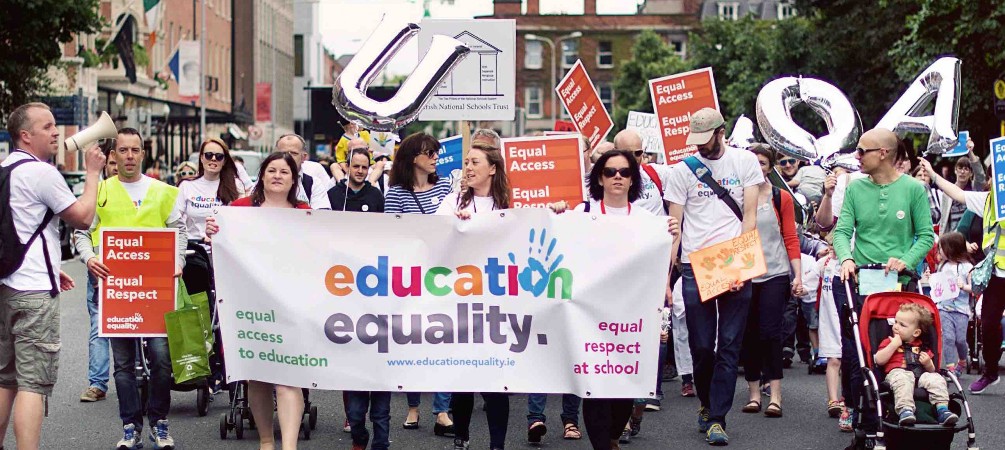In a debate in the House of Lords yesterday afternoon, parliamentarians once again voiced their opposition to the Government’s proposed ban on civil society organisations raising concerns about schools’ unlawful admission arrangements. The Fair Admissions Campaign (FAC), whose joint report with the British Humanist Association (BHA) published last year revealed that virtually all religiously selective schools in England were failing to comply with the School Admissions Code, says parents and children ‘will be the only ones to lose out’ if the ban goes ahead, and has called on the Government to reverse its decision.
Limits on who will be allowed to object to school admissions arrangements were proposed earlier this year by the Education Secretary Nicky Morgan, who claimed that the move was designed to ‘stop vexatious complaints against faith schools by secularist campaign groups’. However, after over 60 questions were tabled in Parliament on the issue by MPs and peers from a range of parties, Schools Minister Lord Nash was forced to admit that the overwhelming majority (87%) of the FAC’s and BHA’s objections to the admission arrangements of religiously selective schools had been upheld.
Indeed, the Office of the Schools Adjudicator, to whom objections to school admission arrangements must be submitted, found at least one violation in every school that the investigation covered. These violations included schools directly discriminating on the basis of race and gender, failing to properly prioritise children in care, and unlawfully asking for information that they did not need, such as parents’ countries of origin, their medical history, or whether or not they spoke English as a second language.
Except for the Minister responding to the debate, Baroness Evans, every peer who contributed to the debate was critical of the Government’s proposals. Shadow Education Spokesperson Lord Watson described the ban as ‘a clear case of shoot the messenger rather than address the problem’, while Baroness Massey labelled it as ‘counterproductive’ and ‘a nonsense’. Echoing these comments, Liberal Democrat Education Spokesperson Lord Storey commented that far from being ‘vexatious’, it was thanks to the FAC and BHA ‘that many wrongs have been righted’, and Lord Desai added that the BHA’s work on admissions was ‘for the good of the education system’. Lord Taverne also contributed, stating that ‘the complexity of some schools’ admissions policies seems designed to confuse and mislead.’
The FAC’s Richy Thompson said, ‘The message in Parliament last night was clear. Schools that seek to bend admission rules to manipulate their intakes must be held to account. The report we published last year may be an inconvenient truth for the faith school sector, but the Department for Education’s decision to back the law breakers, punish the whistleblowers, and seemingly ignore the rights of children altogether, is nonsensical. We’re glad that those speaking in last night’s debate agree and we will continue to push not only for the ban to be reversed but also for a fairer and more transparent admissions system to be introduced.’
Notes
For further comment or information please contact the FAC on info@fairadmissions.org.uk or 020 7324 3078.
Read the full debate: https://hansard.parliament.uk/lords/2016-05-11/debates/16051156000172/SchoolAdmissionsCode
See the FAC’s previous news item ‘Parliamentarians and wider public denounce Government move to ban FAC from raising concerns about schools admissions’: https://fairadmissions.org.uk/parliamentarians-and-wider-public-denounce-government-move-to-ban-fac-from-raising-concerns-about-school-admissions/
Read the BHA’s letter to the Secretary of State: https://humanism.org.uk/wp-content/uploads/2016-01-28-Letter-from-the-BHA.pdf
Read the Secretary of State’s response: https://humanism.org.uk/wp-content/uploads/Letter-from-Nicky-Morgan-to-Andrew-Copson-19-02-2016.pdf
Read the Department for Education’s press release announcing the proposed ban: https://www.gov.uk/government/news/parents-to-get-greater-say-in-the-school-admissions-process
Read the FAC’s previous news item ‘Government moves to ban organisations from exposing law-breaking schools unfairly restricting access to children and parents’: https://fairadmissions.org.uk/government-moves-to-ban-organisations-from-exposing-law-breaking-schools-unfairly-restricting-access-to-children-and-parents/
Read the BHA’s comment piece in the Independent ‘Is Nicky Morgan on the side of children or faith organisations’: http://www.independent.co.uk/voices/is-nicky-morgan-on-the-side-of-children-or-faith-organisations-a6837811.html
Read the FAC report ‘An Unholy mess: How virtually all religiously selective schools are breaking the law: https://humanism.org.uk/2015/10/01/an-unholy-mess-new-report-reveals-near-universal-noncompliance-with-school-admissions-code-among-state-faith-schools-in-england/
Read the FAC’s briefing on the report: https://fairadmissions.org.uk/anunholymess-briefing/
The Fair Admissions Campaign wants all state-funded schools in England and Wales to be open equally to all children, without regard to religion or belief. The Campaign is supported by a wide coalition of individuals and national and local organisations. We hold diverse views on whether or not the state should fund faith schools. But we all believe that faith-based discrimination in access to schools that are funded by the taxpayer is wrong in principle and a cause of religious, ethnic, and socio-economic segregation, all of which are harmful to community cohesion. It is time it stopped.
Supporters of the campaign include the Accord Coalition, the British Humanist Association, Professor Ted Cantle and the iCoCo Foundation, the Association of Teachers and Lecturers, British Muslims for Secular Democracy, the Campaign for State Education, the Centre for Studies on Inclusive Education, the Christian think tank Ekklesia, the Hindu Academy, the Green Party, the Liberal Democrat Education Association, Liberal Youth, the Local Schools Network, Richmond Inclusive Schools Campaign, the Runnymede Trust, the Socialist Educational Association, and the General Assembly of Unitarian and Free Christian Churches.
 Follow
Follow